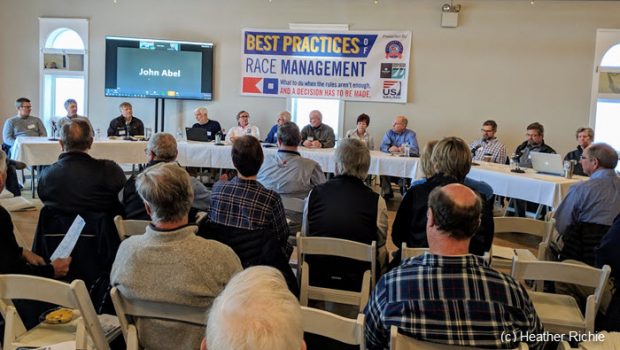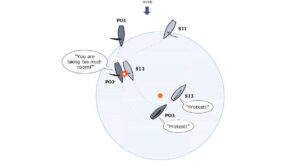Bringing Race Management into focus
Published on January 15th, 2019
by Heather Richie
“In the parlance of education, you want people to really understand things, not just know them,” once said internist and Harvard lecturer Dr. Richard M. Schwartzstein. That’s a highfalutin way of saying we should study things from the inside out.
So, where does that real level of understanding come from? I sometimes liken it to an intuitive sense, when you really feel like ‘I’ve got that, I grasp that thing now’, and often it comes down to wanting an example that’s very common place to grasp in some tangible way, and that then relates to some concept that on the surface doesn’t really resonate.
For years, my local sailing organizations had to women, wives of sailors, who we called the “Two Susans” and were the steadfast sailing committee. When they got busy with grandkids, I watched the seasons when our race committee struggled to stay together until new leadership came in, and I regretted not having served more on race committee with the Two Susans for all I could have learned.
Meanwhile, I’ve spent the last decade listening to my skipper stay heated about regatta rules in my local sailing organization without so much as slowing down long enough to explain things. Still, asking ‘What’s this guy so pissed off about now’ is not the worst motivator when you admire someone’s sailing ability. For someone who did not grow up sailing, it has pushed me to learn for myself the proper way regattas ought to run.
That’s why I accepted an open invitation for sailors or all levels to attend an all-star panel of race officials along with racers and volunteer committee that met January 12 at Charleston Yacht Club for a Race Management forum that strengthened communication between sailors, race officials, and race committee volunteers.
These individuals emphasized the very currency I’d seen running, or perhaps getting lost, through the generations. There is much less to worry about if those managing races keep it in mind to “manage themselves out of a job” as one panelist put it. The group focused on regatta management as a holistic effort rather than the total responsibility of one group, and emphasized the diversity and scalability of tactics applied based on the levels and participation numbers of a race.
Sponsored by US Sailing, Sperry Charleston Race Week, and Charleston Yacht Club, the event brought panel participants from across the US. Panelist included: Sarah Ashton, Kathy Lindgren, Matt Hill, Dick Rose, John Strassman, Rob Hopkins, JD Rosser, Tom Loutrel, Rich Bowen, Tim Fetsch, Jeremy Wilmot, and Michael Miller. Randy Draftz moderated.
A pre-game cocktail hour the evening before and postgame debriefing and networking made the event very worthwhile for those traveling to attend.
Dick ‘Rules’ Rose came from Washington, and emphasized time and again that the little-read forward of the Racing Rules of Sailing calls for suggestions and feedback from anyone. Area D Race Officer JD Rosner mentioned the importance of avoiding ambiguity in modifying rules in your Sailing Instructions, too, by being careful not to simply allude to a modification but to spell it out. A useful discussion point encouraged race officers to listen to sailors regarding wind and possible course shifts, and to call on local knowledge when coming in from out of town.
One of the most instructive discussions involved race officer’s judgement when to pack it in on a day by watching the back of the fleet. It was not lost on anyone that fun recreational sailing breeds competition and professional racers, so there should be no mutually exclusive talk and the fun should be kept in the regatta or participation will suffer.
Mark management, safety, umpiring, volunteer support, and abandonment consistency could be cherry picked from the dozens of topics addressed during the forum. To view video of the event, click here.
A plea from the nosebleed seats: seek out the video, follow this resource as a guide, plan more local events to champion regatta management, and bridge any gaps between regatta participation and regatta management as I am your slow learning proof that open invitations and holistic community approaches to regatta management will preserve the sport for the next generation.
There was some young leadership in attendance at the forum, but it will take more to translate the body of knowledge down the line. Women represented roughly 10% of participants, for what it’s worth. As participation numbers in sailing continue to threaten decline, encouraging diversity of age, gender, and ethnicity is critical now as ever.
The Best Practices of Race Management Forum allowed for Zoom video conference participation for non-attendees to voice their questions and comments remotely. I am fortunate to be in a community that works to bring in US Sailing and other training opportunities often enough that I could take them for granted starting from scratch a decade ago and turning over every rock until, as Dr. Schwartzstein put it, I really began to understand things, not just know them.
The one lesson I am sure I have down pat is that your participation matters. If you’re reading this, I mean you. Race management is fun, cool, and sexy. There is no line between it and sailors. Maybe one of my biggest confusions over this in my first ten years on the water was feeling like I had to choose between one or the other, but several of the panelist divide time somewhat equally between racing, managing, and in some cases, judging.
I don’t know why I was so stubborn about seeing this on a hyper local level (one club in one city), but when we open the lens just a little wider, sometimes things come into focus.









 We’ll keep your information safe.
We’ll keep your information safe.